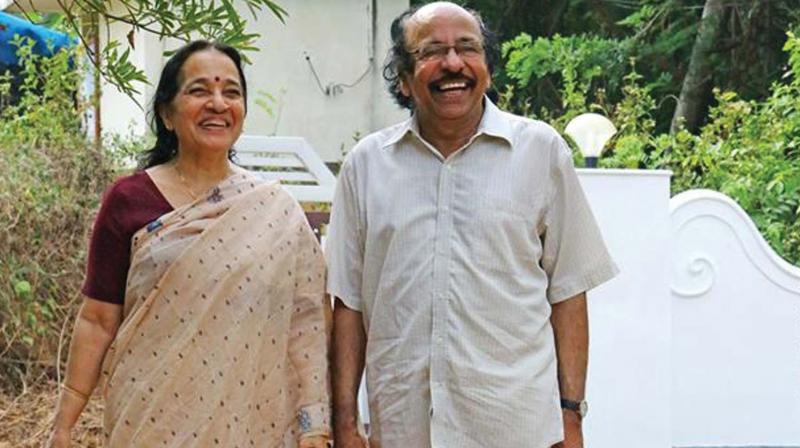Poetic protests of a humble man
K. Satchidanandan, who won the prestigious Ezhuthachan Puraskaram this year, talks about his journey.

The excitement before meeting the man for the first time melts when he enters the room. Before he knows anything about you, K. Satchidanandan will give you his warmest smile, shake hands like you are his favourite child. His poetry begins there, you think, the way he looks at you. An old habit, you gather, as you dig out bits from a long past full of stories he can tell you beautifully about. He does that for an interview, keeping aside some time even as he is crowded with meetings and engagements, days after winning the Ezhuthachan Puraskaram, the highest literary honour given by the Kerala Sahitya Akademi.
"My first experience of great poetry was of reading the Sundarakanda and Yudhdhakanda of Ezhuthachan's Adhyatma Ramayana. I read them as part of the ritual reading at home which sometimes fell to me. It was high voltage Malayalam with the splendour of a thousand suns. And the images the lines brought up were so vivid and powerful," Satchida, as he is fondly known as, says. He wrote a poem on Ezhuthachan when he was 26. Some more poems based on Ramayana followed including the more recent one on Sita, Come, Janaki. "Ezhuthachan continues to be present in our poetry as the creator of modern Malayalam with the music of Tamil and the solidity of Sanskrit," he says.
In his early undergraduate days at the Christ College in Irinjalakuda, it was the librarian John Master who also taught Syriac (Aramaic) that helped him in suggesting what to read. "Every writer will have such little known people who nurtured them though often writers forget or ignore them.”
“But I recall each of them including some school teachers like Neelakanta Das and Raghavan Master who created in me an abiding interest in Malayalam language and literature and Balakrishnan Master who initiated me into the charms of English," Satchida remembers all the names.
It is afterward he became a teacher himself, continued to be one for more than two decades. The years that gave him memories that shocked or made him laugh. There was a student who used to take money from him for his fee, who he later found out was from a rich family and had been lying. There was another who stole his book and later became a policeman. "But the best times are when you meet old students whom you hardly recognise as they often look older than yourself and claim with pride that I had taught them in college or they give you a reception abroad when you visit the place and fill the evening with tender recollections. I have come across my students all over India, in the Gulf countries, in London, in Perth, even in Stockholm. That is a teacher's real reward: the regard they retain for you even after years, whatever their status in life."
Even as he taught, Satchida kept writing. He wrote his Ezhuthachan Ezhuthumbol and poems like Naavu Maram, Nishpakshata and Kaaval at the time of the Emergency — some poems were censored. He was taken to Crime Branch offices in Trichur and Palghat and questioned as he was also suspected to be a Maoist. A memory that could draw parallels with the several incidents of attacks and bans on writers across the country today. "Emergency was there, visible, tangible, publicly declared. It (mis)used the Indian Constitutions in order to silence democracy. But now a democratic mandate is being used to subvert the Constitution and deny even the fundamental rights it guarantees to Indian citizens. This is a covert operation carried out by the small, often secret, local outfits of the Sangh Parivar, its many senas like Hanuman Sena, Sanatan Sanstha et al with the undeclared support of the Central Government. Hence it is more difficult to fight. Their operation is not very different from that of terrorists. Their targets re minorities of all kinds, emancipated women, workers and peasants, dissenting writers, artists and public intellectuals and social workers who expose their tactics."
Satchida protested against all he thought unjust, through his words, actions. Poems like Ini onnu visramikatte, Bodhavati and Neethivriksham got written. He stepped down from his Sahitya Akademi post in 2015 at the time writers across the country protested what they called growing intolerance by returning awards and honours. Words, sometimes as Facebook posts, have been his way around. Poetry, he says, is organic to his existence, is his prime mode of expression that makes life with all its bitterness worth living. "It is inevitable and its force undeniable. It is the way I relate to myself, to society, to nature and the larger cosmos."
His poems also feature his family — wife Bindu, daughters Saritha and Sabitha. He discovered recently that the most number of poems he wrote are on language and poetry itself. "My only prayer now is that poetry may never leave me till my last breath even in my last, may be lonely, days." That takes you to his poem, Oduvil njan ottayakunnu, At last I am alone. A title that makes you sad after reading his post about a small stroke he suffered recently, which brought along a black-out and temporary memory loss. But love will win, he writes on his Facebook, hugs to all, and he will take it slow.

